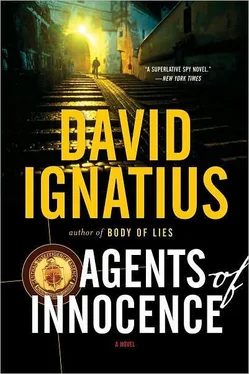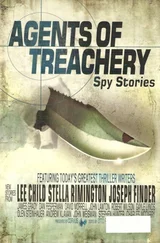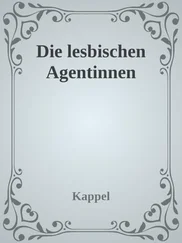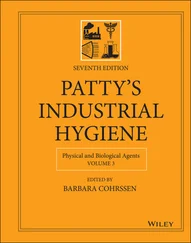David Ignatius - Agents of Innocence
Здесь есть возможность читать онлайн «David Ignatius - Agents of Innocence» весь текст электронной книги совершенно бесплатно (целиком полную версию без сокращений). В некоторых случаях можно слушать аудио, скачать через торрент в формате fb2 и присутствует краткое содержание. Жанр: Шпионский детектив, на английском языке. Описание произведения, (предисловие) а так же отзывы посетителей доступны на портале библиотеки ЛибКат.
- Название:Agents of Innocence
- Автор:
- Жанр:
- Год:неизвестен
- ISBN:нет данных
- Рейтинг книги:3 / 5. Голосов: 1
-
Избранное:Добавить в избранное
- Отзывы:
-
Ваша оценка:
- 60
- 1
- 2
- 3
- 4
- 5
Agents of Innocence: краткое содержание, описание и аннотация
Предлагаем к чтению аннотацию, описание, краткое содержание или предисловие (зависит от того, что написал сам автор книги «Agents of Innocence»). Если вы не нашли необходимую информацию о книге — напишите в комментариях, мы постараемся отыскать её.
Agents of Innocence — читать онлайн бесплатно полную книгу (весь текст) целиком
Ниже представлен текст книги, разбитый по страницам. Система сохранения места последней прочитанной страницы, позволяет с удобством читать онлайн бесплатно книгу «Agents of Innocence», без необходимости каждый раз заново искать на чём Вы остановились. Поставьте закладку, и сможете в любой момент перейти на страницу, на которой закончили чтение.
Интервал:
Закладка:
Jamal clucked his tongue. He muttered an Arabic expression that means: So what?
Fuad took Jamal by the elbow and tried to talk to him as a friend.
“This is serious,” he said. “Do you remember the first American that you met? The one who called himself Reilly? I have never heard him so upset. He is always the calm one. You must come to the meeting. The Americans don’t make threats unless they are serious.”
“I will think about it,” said Jamal.
“No,” pressed Fuad. “They need an answer now.”
“Impossible. I need to talk to someone.”
“I will wait here in Fakhani for the answer,” said Fuad.
“Go back to Hamra.”
“I will wait here.”
The Palestinian gave up. He left Fuad standing near a lamppost on the road outside the stadium.
If the decision had been left to Jamal, he would not have attended the meeting with the Americans. Rome had soured him on dealing with the United States. But the decision, in the end, wasn’t his to make. It was the Old Man’s. Jamal sent a message to the Old Man’s personal secretary requesting a quick audience. It was granted late that afternoon. The Fatah leader refused his young protege nothing.
Jamal explained that the Americans had made an urgent request. He quoted Fuad. A matter of the highest importance. A threat of retaliation.
The Old Man smiled as he listened to Jamal. An odd smile of satisfaction.
“I don’t want to meet with them,” said Jamal. “The Americans are not trustworthy. It is too sensitive a moment. My work is too delicate right now, too dangerous.”
The Old Man was still smiling.
Jamal explained his reluctance with various circumlocutions. He was vulnerable. He knew sensitive information. There were operations that could be compromised. He didn’t say what he really meant: that he was one of a tiny handful of people who knew the secret of Black September; that the Americans might try to force him to divulge the secret. But he said none of that. The rules of the game required that no one even mention the words “Black September” in the presence of the Old Man. Jamal noticed, as he talked, that the Old Man wasn’t really listening. His eyes were wide with what appeared to be-how could it be?-a look of hope.
“I think we have won,” said the Old Man, when Jamal had finally finished.
“What, Father?” asked Jamal.
“We have won! The Americans are frightened. They have come to talk peace. That is why they want to see you. They understand that they need our help. You must see them.”
“I think you are wrong, Father,” said Jamal.
“I am right!” said the Old Man, beaming with the optimism that coursed through his veins like water through a rushing river. “We have won. Thanks be to Allah! You will see the Americans. That is an order.”
Jamal rejoined Fuad that evening. Yes, he would see the Americans. Fuad was overjoyed. He outlined the details. They would all meet in Fuad’s apartment in Ras Beirut the next afternoon. That was as close as they could come to neutral ground. Fuad pledged on his honor as an Arab and a Moslem that no harm would come to Jamal.
“If the Americans try any tricks, I will shoot them myself,” said Fuad. He patted a bulging object under his jacket. It was the first time Jamal had ever seen Fuad carrying a gun.
Fuad’s apartment was on a side street off Hamra. The street teemed with life. Sidewalk vendors noisily advertised lottery tickets and bootlegged cassette tapes. The neighborhood butcher hacked away at a carcass of beef hanging in his doorway. And a Turkish restaurant filled the air with smoke and the smell of charcoal and spices.
Stone, Hoffman, and Rogers made their way through this commotion and were waiting in Fuad’s apartment when Jamal arrived. The Palestinian was dressed in his usual defiant outfit: leather jacket, silk shirt open at the neck, and black leather boots.
Rogers met Jamal at the door.
“No guns,” said Rogers.
Jamal removed an automatic pistol from a shoulder holster.
“Sorry, but I’ll also have to frisk you.” He did so quickly and found nothing. He then escorted Jamal into the living room.
Rogers made the introductions, calling Stone “Mr. Green” and Hoffman “Mr. Brown.” Jamal regarded the three Americans warily. None of them had the self-importance of the man he had met in Rome. “Mr. Green” looked like an Englishman. As for “Mr. Brown,” he was overweight, his shirt was sticking out of his trousers, and he had a soup stain on his tie.
Stone took charge of the meeting. He had a military man’s way of asserting command naturally and spontaneously, through simple changes in his voice and posture.
“I have come urgently from Washington because of a matter of the highest importance to the United States government,” Stone began.
Jamal nodded. He pushed his hair back off his forehead.
“I would like you to listen to something,” said the American, turning to a large reel-to-reel tape recorder on the table next to him.
Jamal nodded again.
Stone flipped the switch on the tape recorder. The division chief watched Jamal’s face carefully as the recorder played the conversation between him and Omar Mumtazz. Throughout the conversation, even during the exchange about suits and shoes, Jamal’s face was impassive.
“We have absolutely no doubt that this is your voice,” said Stone, after turning off the machine. “I won’t trouble you with an explanation of the technical methods of analysis that allow us to be so confident that it is you. We also understand the meaning of the coded message. It is a request by you for guns and explosives.”
Jamal blinked. He took out a Marlboro cigarette. Stone continued.
“There is only one thing that concerns me. We have been told that you are planning to kill the President of the United States. If this is true, I must warn that you have embarked on a most dangerous course. One that will have ruinous consequences for you and your organization.”
Stone bowed his head gently, like a priest who has just given a condemned man the last rites.
“Is there anything you would like to say?” asked Stone.
“Yes,” said Jamal, his eyes flashing with anger. “The Libyan is a liar. If you believe him you are a fool.”
“The Libyan?” asked Stone blankly.
“Yes, of course, the Libyan! The Libyan named Omar Mumtazz, who smuggles guns and drugs. The Libyan who knows me as Nabil. The Libyan who has taped my phone calls. The Libyan who has made up a tale about me killing the president.”
“Ah yes,” said Stone.
Jamal relaxed slightly.
“Without of course confirming that this fellow-Omar, did you say?-was the source of our information, let me ask you a question. Why would someone invent a tale like that about an assassination plot?”
“To make himself important,” answered Jamal. “To give himself something to bargain with. I don’t know why. You tell me. Why do people sell false information to intelligence services? It happens every day.”
“Well, you’re quite right there,” said Stone. “Yes indeed. People do peddle false information. Quite right.”
“Of course they do,” said Jamal.
“But let me ask you another question. Why would you want to purchase this little arsenal of equipment? I believe the list included four pistols with silencers, one hundred kilos of high-velocity explosives. Why would you want to acquire these items?”
“That isn’t any concern of the United States!” said Jamal.
Hoffman, who had been listening in silence, leaned forward in his chair toward the Palestinian.
“Bullshit,” he said. “It’s our business now.”
Stone smiled genially at Hoffman and then turned back to Jamal.
“Perhaps you would like to tell us why this isn’t any concern of the United States.”
Читать дальшеИнтервал:
Закладка:
Похожие книги на «Agents of Innocence»
Представляем Вашему вниманию похожие книги на «Agents of Innocence» списком для выбора. Мы отобрали схожую по названию и смыслу литературу в надежде предоставить читателям больше вариантов отыскать новые, интересные, ещё непрочитанные произведения.
Обсуждение, отзывы о книге «Agents of Innocence» и просто собственные мнения читателей. Оставьте ваши комментарии, напишите, что Вы думаете о произведении, его смысле или главных героях. Укажите что конкретно понравилось, а что нет, и почему Вы так считаете.












